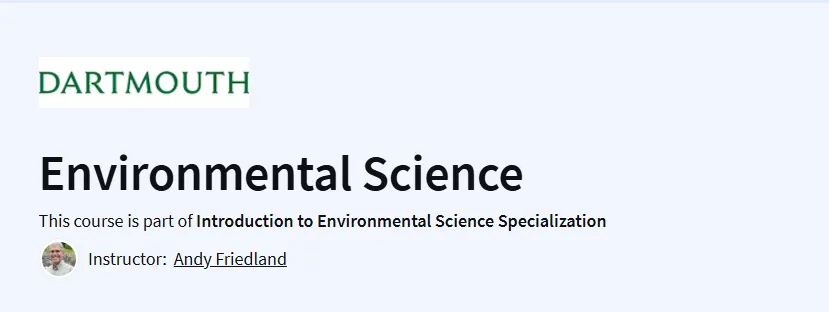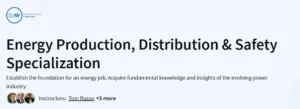What you will learn in Environmental Science By Dartmouth College Course
- Explore key concepts like ecosystems, biodiversity, and sustainability.
- Analyze human impacts on climate change, pollution, and resource depletion.
- Learn about policy frameworks (e.g., Kyoto Protocol, Paris Agreement) and their role in environmental protection.
- Study renewable energy solutions and waste management strategies.
- Apply scientific methods to assess environmental challenges through case studies.
- Develop critical thinking skills to evaluate trade-offs in conservation vs. development.
Program Overview
Earth’s Systems & Ecosystems
⏱️ 3-4 weeks
- Understand biogeochemical cycles (carbon, water, nitrogen).
- Examine ecosystem services and biodiversity hotspots.
- Discuss threats like deforestation and habitat loss.
Human Impacts & Climate Change
⏱️ 4-5 weeks
- Learn about greenhouse gases, fossil fuels, and global warming.
- Analyze air/water pollution sources and health effects.
- Explore urbanization’s ecological footprint.
Sustainability & Solutions
⏱️ 4-5 weeks
- Study circular economy models and green technologies.
- Compare renewable energy options (solar, wind, hydro).
- Evaluate sustainable agriculture and water conservation.
Policy & Advocacy
⏱️ 3-4 weeks
- Review international environmental laws and treaties.
- Debate ethical dilemmas (e.g., economic growth vs. conservation).
- Learn how NGOs and governments drive change.
Capstone Project
⏱️4-6 weeks
- Propose a solution to a local environmental issue (e.g., plastic waste, energy efficiency).
- Present findings via a report or multimedia presentation.
Get certificate
Job Outlook
- Growing demand for environmental scientists (projected 8% job growth by 2030, U.S. BLS).
- Careers in sustainability consulting, policy analysis, conservation, and corporate ESG (Environmental, Social, Governance) roles.
- Entry-level salaries: 50K70K; higher in tech/gov sectors.
- Skills gained align with LEED certification, environmental law, and climate research.
Specification: Environmental Science By Dartmouth College
|
FAQs
- Learn to view ecosystems as interconnected systems—considering energy flow, nutrient cycles, and feedback loops.
- Case studies from Dartmouth surroundings illustrate real-world systems in action.
- Explore how agriculture, population, and energy use directly interact with ecological health.
- Develop the ability to analyze human impacts within complex environmental frameworks.
- Build habits of thinking holistically—critical in sustainability roles and policymaking.
- The course explores impacts of food choices—from meat to organic and industrial farming options.
- You’ll learn frameworks for evaluating energy sources—renewable and non-renewable.
- It encourages reflection on personal carbon footprint and resource consumption patterns.
- Examination of global cycles (carbon, nitrogen) provides tools to understand sustainability metrics.
- Discussion-based assignments reinforce applying these insights to daily life and decisions.
- The course uses both prompted and open discussion formats to engage learners.
- Learners praise the engaging and well-structured lectures, citing clear, compelling delivery.
- Case studies and assignments encourage real dialogue around environmental issues.
- The course community allows exchange of ideas and perspectives across global learners.
- With thousands enrolled, the peer network and discussion forums are vibrant and supportive.
- Strengthens systems thinking, environmental analysis, and scientific reasoning—key for environmental policy or planning roles.
- Builds understanding in areas like energy, biodiversity, demography, and ecosystem management.
- Ideal preparation for roles such as Environmental Consultant, Policy Analyst, or Sustainability Manager.
- Prepares you for applied work in land management, environmental education, or natural resources.
- The specialization offers a certified learning path recognized across sectors for environmental expertise.
- While not universally credit-bearing, some institutions (like University of Sydney) accept the course as equivalent to prerequisite calculus—but consult each university’s policy.
- Many learners use it as verified evidence of environmental science competence in resumes or applications.
- The certification can be added to your LinkedIn or academic portfolio to show subject commitment.
- Great for demonstrating interdisciplinary strength when applying to environmental studies or related programs internationally.





